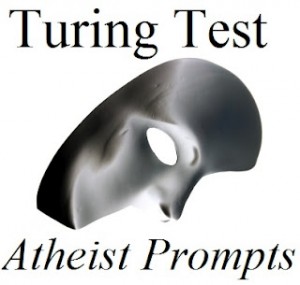This is the fifth entry in the Atheism round of the 2012 Ideological Turing Test for Religion. In this round, the honest answers of atheists are mixed in with Christians’ best efforts to talk like atheists. It’s your job to see if you can spot the difference. The voting link appears at the end of the entry, and you can look at all entries in this round here.
When (if ever) have you deferred to your philosophical or theological system over your intuitions?
I’m very wary of doing that. When people say they are overruling their intuitions they are mostly acting on beliefs they would like to have but actually don’t.
I think the closest I come to overruling intuitions is trying to correct for some of the frighteningly many cognitive biases humans are prone to. But in practice I don’t try to pitch intuitions against abstract principles. Rather I try to build an intuition of mistrusting some other intuitions, so that I actually think of the biases when I’m likely to be affected. Once I suspect I may be wrong, figuring it out is the easy part. What’s hard is suspecting in the first place.
Another example is empathizing with people where I instinctively wouldn’t. Whatever abstract theories we might have, that is at the heart of what morality is in practice. But, while I’m talking pragmatically, that, too, is more about molding intuitions than about overruling them.
Ultimately trying to overrule intuitions with theoretical insights doesn’t work. They tend to win out before the rational mind even notices what happened. What actually works is gradually improving the intuitions so they don’t need to be overruled.
Are there people whose opinions on morality you trust more than your own? How do you recognize them? How is trusting them different than trusting someone’s opinion on physics?
To some extent other people are experts on how they are being hurt. So, for example, I need to be very careful to listen to minorities where my privilege might make it hard to see the evil myself.
And that’s not the only kind of situation where it is wise to seek out other people’s moral opinions. For example, I might be biased if I stand to win from doing something that might be bad. Then it helps to talk to someone I trust who wouldn’t share in my winnings. Or someone might previously have been in the situation I’m in at the moment. And of course many moral questions actually turn more on the relevant facts than on the moral theory, so where I don’t know the facts I might defer to someone who actually does.
However, none of this changes the fact that it’s me making the moral choice. Ultimately morality is personal and totally deferring to some authority is just one more way to chicken out of it.
And frankly, that particular way of chickening out scares me. The way humans work, the authority will always abuse the power. I think history bears that out. Moral progress actually happened by stepping past unquestionable authorities.
Can you name any works of art (interpreted pretty broadly: books, music, plays, poetry, mathematical proofs, etc) which really capture the way you see life/fill you with a sense of awe and wonder? You can give a short explanation or just list a few pieces.
Those are two very different questions, or maybe even three, because the worldview part can be interpreted more or less broadly.
Small Gods by Terry Pratchett is a hilarious novel capturing my atheism. Of course it isn’t even trying for the kind of depth that keeps people unsettled for days. And I think that’s exactly right, because atheism itself is just a negative. It’s interesting because it’s a negative so many people try to avoid, but in itself the nonexistence of gods shouldn’t make us any more teary-eyed than the nonexistence of leprechauns. It’s just not a very emotional question.
So moving on to things I do believe in, I really care about empathy. In our society one of the main questions on which religion interferes with empathy is LGBT rights. So, while it doesn’t mention atheism or religion at all, There’s a girl by the Ditty Bops is a song that gives a gut level impression of how it hurts gay people to keep on pretending they don’t exist.
For awe and wonder I would look to classical music. I’m nowhere close to being an expert so I’ll just link to two rather famous pieces. Both stir up different emotions I can’t fully verbalize.
Click here to judge this entry, and, once you’ve voted, feel free to speculate and trade theories in the comments or look at other entries in this round.












